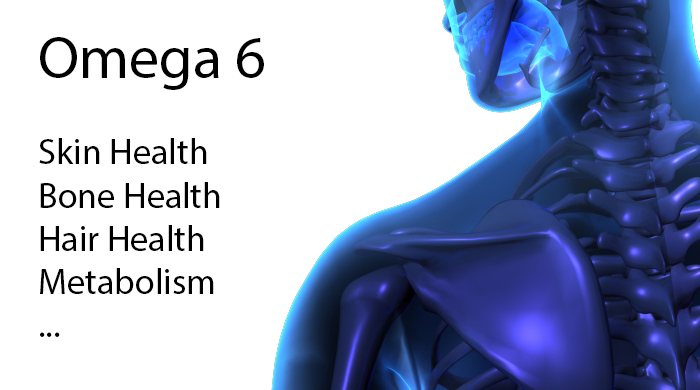What is Omega-6 | Omega-6 Fatty Acid Benefits
Omega-6 Fatty Acids – Essential Fatty Acids

Omega-6 fatty acids in balance with omega-3 fatty acids are necessary for healthy living. The omega-6 fatty acid, linoleic acid (LA), is considered an essential fatty acid because the body can’t make it, and it has to be attained from the foods we eat.
Most but not all omega-6 fatty acids are pro-inflammatory and they must be regulated by the anti-inflammatory omega-3 fatty acids. The typical American diet often contains 14 – 25 times more omega-6 fatty acids than omega-3 fatty acids, while a healthy diet should consist of a ratio of 3:1 omega-6 to omega-3.
Regular inflammation is a normal part of a healthy immune response system, which is a release of cells and chemicals that heal injuries and fight infections. Chronic inflammation occurs when something starts the inflammation process and doesn’t shut it down. An excess of pro-inflammatory substances, prolonged infections, and smoking trigger chronic inflammation. Obesity can also trigger chronic inflammation, because increased fat cells produce more inflammatory proteins called cytokines. Chronic inflammation is linked to heart disease, Alzheimers, and diabetes.
Omega-6 fatty acids linolenic acid (LA) and arachidonic acid (AA) are pro-inflammatory, while gamma-linolenic acid (GLA) is anti-inflammatory. The body converts linolenic acid into gamma-linolenic acid (GLA), and also converts gamma-linolenic acid (GLA) into arachidonic acid (AA). Gamma-linolenic acid (GLA) is also converted into Dihomo-gamma-linolenic acid (DGLA) which fights inflammation.
Omega-6 Benefits
Supports Bone Health
Omega-6, particularly gamma-linolenic acid (GLA), is linked to increased bone density and reduced bone loss. In studies where subjects were given GLA supplements and eicosapentaenoic acid (EPA – an omega-3 fatty acid) supplements, the GLA subjects experienced reduced bone loss and increased bone density as compared to subjects given a placebo.
Omega-6 and Metabolism
I found this to be an interesting and complex area. Omega-6 fatty acids have been found to suppress thyroid signaling. Before I go on, it is important to remember that omega-6 fatty acids are essential for healthy living. The thyroid gland, located on the front part of the neck below the Adam’s apple, produce thyroid hormones, which regulate body metabolism. The thyroid regulates the body’s energy, production and growth of cells, and the use of hormones and vitamins. Omega-6 fatty acids are necessary for correct regulation of the thyroid gland. Omega-6 and omega-3 fatty acids work hand in hand, and maintaining a balance close to 3:1 omega-6 to omega-3 is very important for supporting healthy living.
Supports Skin and Hair Growth
Omega-6 helps promote hair growth and supports skin health. Omega-6 has an anti-inflammatory affect on our skin, soothing irritated skin. GLA has been been used to treat epidermal hyperproliferation, a condition when the skin cells reproduce at a faster than normal rate. This happens with skin diseases such as psoriasis and eczema. GLA is absorbed into the skin and repairs the skin barrier, resulting in the skin retaining moisture and staying flexible. Omega-6 fatty acids are also necessary for moisturizing the scalp and supporting hair health.
Oils High In Omega-6 (LA) Fatty Acids
It is important to remember that the typical American diet contains an abundance of omega-6 fatty acids in comparison to omega-3 fatty acids. Most of these omega-6 is in the linolenic acid (LA), which is pro-inflammatory, and most of the omega-6 we consume comes from cooking oils. Care should be taken to reduce the amount of omega-6 we consume.
- Corn Oil
- Cottonseed Oil
- Grapeseed Oil
- Safflower Oil
- Soybean Oil
- Sunflower Oil
- Vegetable Oil
Try using coconut oil as a substitute, coconut oil is a super oil.
References:
Omega-6 fatty acids
GLA and Skin
Tags: benefits, coconut oil, fatty acids, inflammation






